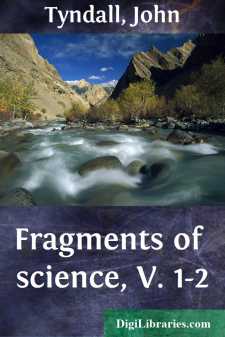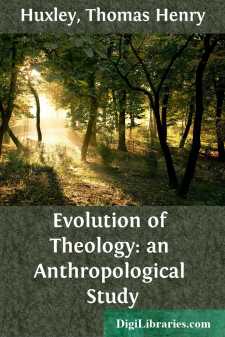Science
- Astronomy 18
- Biology 40
- Chemistry 13
- Electricity 1
- General 38
- History 6
- Light 1
- Paleontology 2
- Philosophy & Social Aspects 1
- Physics 3
- Relativity 2
- Study & Teaching 1
- Waves & Wave Mechanics 1
Science Books
Sort by:
by:
Bertha M. Clark
CHAPTER I HEAT I. Value of Fire. Every day, uncontrolled fire wipes out human lives and destroys vast amounts of property; every day, fire, controlled and regulated in stove and furnace, cooks our food and warms our houses. Fire melts ore and allows of the forging of iron, as in the blacksmith's shop, and of the fashioning of innumerable objects serviceable to man. Heated boilers change water into...
more...
PREFATORY NOTE. In complying with the wish of the publishers of Professor Haeckel's reply to Professor Virchow, that I should furnish a prefatory note expressing my own opinion in respect of the subject-matter of the controversy, Gay's homely lines, prophetic of the fate of those "who in quarrels interpose," emerge from some brain-cupboard in which they have been hidden since my...
more...
by:
John Tyndall
I. THE CONSTITUTION OF NATURE. [Footnote: 'Fortnightly Review,' 1865, vol. iii. p. 129.] WE cannot think of space as finite, for wherever in imagination we erect a boundary, we are compelled to think of space as existing beyond it. Thus by the incessant dissolution of limits we arrive at a more or less adequate idea of the infinity of space. But, though compelled to think of space as...
more...
by:
Justus Liebig
LETTER I My dear Sir, The influence which the science of chemistry exercises upon human industry, agriculture, and commerce; upon physiology, medicine, and other sciences, is now so interesting a topic of conversation everywhere, that it may be no unacceptable present to you if I trace in a few familiar letters some of the relations it bears to these various sciences, and exhibit for you its actual...
more...
by:
Grant Allen
FALLING IN LOVE An ancient and famous human institution is in pressing danger. Sir George Campbell has set his face against the time-honoured practice of Falling in Love. Parents innumerable, it is true, have set their faces against it already from immemorial antiquity; but then they only attacked the particular instance, without venturing to impugn the institution itself on general principles. An old...
more...
by:
Nikola Tesla
Biographical Sketch of Nikola Tesla. While a large portion of the European family has been surging westward during the last three or four hundred years, settling the vast continents of America, another, but smaller, portion has been doing frontier work in the Old World, protecting the rear by beating back the "unspeakable Turk" and reclaiming gradually the fair lands that endure the curse of...
more...
by:
Joseph Black
Hoffman, in one of his observations, gives the history of a powder called magnesia alba, which had long been used and esteemed as a mild and tasteless purgative; but the method of preparing it was not generally known before he made it public. It was originally obtained from a liquor called the mother of nitre, which is produced in the following manner: Salt-petre is separated from the brine which first...
more...
by:
Joseph Priestley
THE PREFACE. One reason for the present publication has been the favourable reception of those of my Observations on different kinds of air, which were published in the Philosophical Transactions for the year 1772, and the demand for them by persons who did not chuse, for the sake of those papers only, to purchase the whole volume in which they were contained. Another motive was the additions to my...
more...
I conceive that the origin, the growth, the decline, and the fall of those speculations respecting the existence, the powers, and the dispositions of beings analogous to men, but more or less devoid of corporeal qualities, which may be broadly included under the head of theology, are phenomena the study of which legitimately falls within the province of the anthropologist. And it is purely as a...
more...
by:
William Bateson
In seeking to discover Darwin's relation to his predecessors it is useful to distinguish the various services which he rendered to the theory of organic evolution. (I) As everyone knows, the general idea of the Doctrine of Descent is that the plants and animals of the present day are the lineal descendants of ancestors on the whole somewhat simpler, that these again are descended from yet simpler...
more...











